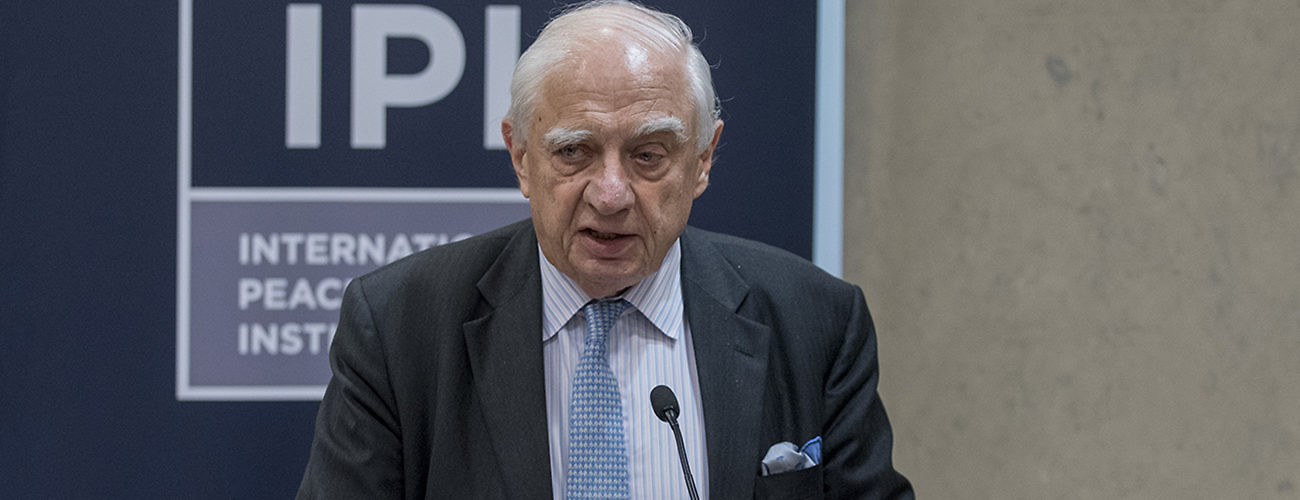The United Nations Special Representative of the Secretary-General for International Migration, Peter Sutherland, told an IPI audience that the UN had to be in the lead in finding solutions to the worldwide crisis on refugees and migrants.
Mr. Sutherland made his remarks at a July 20, 2016 event, “Ensuring No One is Left Behind: A High-Level Dialogue on Migration and Refugees.” The discussion, co-organized with the Quaker UN Office, and the Permanent Missions of Finland, Mexico, and Morocco to the United Nations, addressed the question of how to connect the dots between the 2030 Agenda and the UN General Assembly’s high-level meeting on addressing large movements of refugees and migrants, scheduled for September 2016.
Mr. Sutherland noted that the 2030 agenda was “itself a fine document—recognizing the benefits of migration.” He conceded however, that such declarations might not translate to action. “Words are cheap,” he said.
To that end, he emphasized that the UN must be willing to speak out about the obligations of member states, in order to ensure that the September summit is not another “exercise in merely restating platitudes.”
Instead, the compacts to be adopted on refugees and migrants this September must be geared towards making real headway. To make this possible, the UN must “be an initiator of progress,” Mr. Sutherland said.
Omar Hilale, Permanent Representative of Morocco and upcoming Co-Chair of the Global Migration Group, called for the high-level meeting to address the needs of both refugees and migrants.
Refugees are defined as people who are forced to leave their country because they are at risk of persecution. By contrast, a migrant makes a conscious choice to leave in pursuit of a better life. Because of this difference, some consider addressing the needs of refugees to be a higher priority than those of migrants, he said. Mr. Hilale cautioned against putting one group’s needs before the other. “Migrants and refugees are distinct, and have distinct laws related to them, but they must be targeted together, as they face similar challenges,” he said.
The UN must not adopt a compact on refugees without addressing migration, he warned. “Both issues are important and deserve urgent attention.”
The General Assembly’s high-level meeting “should have a balanced approach towards migration and refugees,” he asserted.
Karen AbuZayd, Special Adviser on the Summit on Addressing Large Movements of Refugees and Migrants, noted that the September session would be a key opportunity to establish clear, international commitments—in particular to aid the countries receiving refugees—86% of which are developing nations.
“Refugee children are five times more likely to be out of school,” she said. There must be greater burden sharing among the international community,she said, as these developing nation host countries face challenges to meet the needs of even their own populations.
Miguel Ruiz Cabañas, Deputy Minister of Multilateral Affairs and Human Rights of Mexico, called for a change in the “negative” narrative on migration, recognizing it instead as a virtuous cycle. With harsh rhetoric in the headlines, “the UN must stand against misinformation, fear, and xenophobia,” he said.
Building on that theme, Christine Matthews, Deputy Director of the United Nations High Commissioner for Refugees’ New York Office, said she believes that much of the xenophobic attitudes in host countries is derived from the “misperception that migration flows threaten local economies.”
The UN Sustainable Development Goals (SDGs) are an opportunity to “redouble our efforts to bring an end to long-term refugee situations,” she said.
Looking ahead to September’s summit, Ms. Matthews reminded participants that the international community will “not be starting from scratch.” Noting that the 1951 Refugee Convention has still not been fully implemented, she called for the session’s outcome documents to “reaffirm the principles for the protection of refugees.”
Adam Lupel, IPI Vice-President, moderated the conversation.








